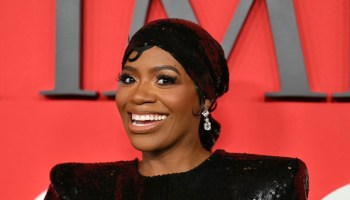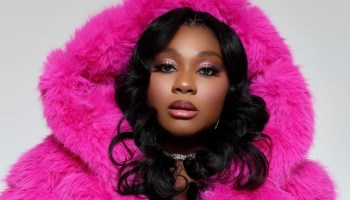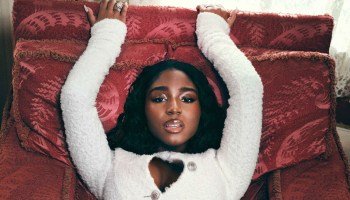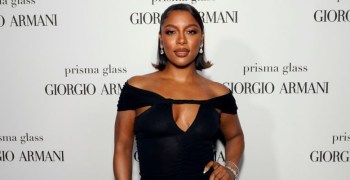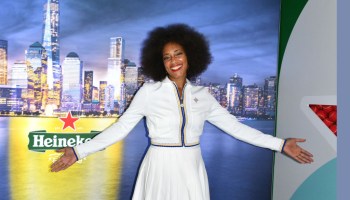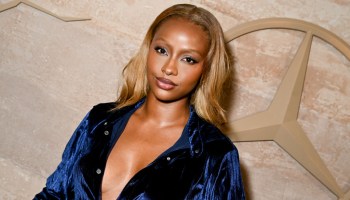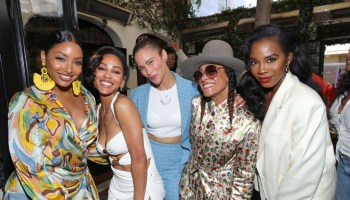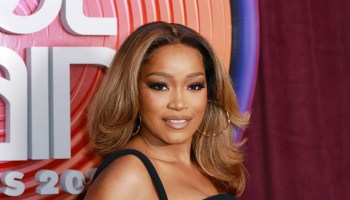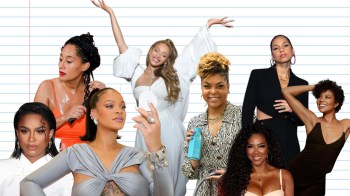A bombshell new report from Black Women for Wellness, an L.A.-based advocacy and research group dedicated to the health and wellness of Black women, released a 60-page document this spring with shocking finds linking many major hair care brands to toxic and poisonous chemicals.
The report, titled Natural Evolutions: One Hair Story, accuses the hair care and personal care industry of lacking regulation, as well as causing major health problems among Black women.
“We aim to expand healthcare access, reduce toxic hair care chemicals that are prevalent in our community, and build political advocacy in California and beyond.” ~ Black Women for Wellness, Mission Statement
After five years of research (including data collection, focus groups, and historical research), the study indicates our beauty routines may be contributing to our demise. The consistent exposure to certain products may affect our health down the road.
HelloBeautiful spoke exclusively to Teni Adewumi, Environmental Justice Research and Policy Analyst for Black Women for Wellness, explaining the reasoning for conducting this study.
“There wasn’t a lot of literary information on the products that we use and what that specifically means for Black women. The little information and the little research we found was not very promising. We wanted to know what group of Black women might be most impacted,” Teni explained.
“Really looking at the products we use as Black women, we use these products more frequently than any other ethnic group. We wanted to know if these products were affecting us in any kind of way.”
Black women and girls already have a disadvantage and overwhelming burden as a result of disparities in health care. The Robert Wood Johnson Foundation, the United States’ largest philanthropy dedicated to health, estimates Latinos and African-Americans experience 30 to 40 percent poorer health outcomes than White Americans.
Our hair health is at risk due to lack of information on products, affecting the safety of hair dressers and causing serious health issues, including respiratory problems, obesogens, and cancer at higher rates than our female counterparts of other races.
Here are the findings from the report:
Reproductive Issues
The American Journal of Epidemiology determined that the use of hair relaxers is linked to uterine fibroids in Black women and girls. This will affect approximately 80 percent of Black women. The study interviewed more than 23,000 Black women across the span of 12 years (1997-2009) and found two-to-three times higher rates of fibroids among Black women. The possibility of unregulated and untested chemicals, as well as the amount of chemicals we place in our hair and scalp, is potentially dangerous.
While Black Women for Wellness admits there is still more testing needed to determine birth outcomes and the use of hair care products, they do present information regarding the links between miscarriage, low birth weight, and chemicals found in products used by hair dressers that are causing some concern. They bring light to the fact that even though the national rates of infant mortality have been decreasing, “Black women still have rates of infant death 2.2 times higher than White women (11.46 to 5.18 respectively).”
Respiratory Issues
The One Hair Story research paper called out a UK study that estimated 14 to 20 percent of cosmetology students drop out during their first two years due to contact dermatitis. Seven out of 10 hairstylists will likely suffer a form of work-related dermatitis during their career.
“Hair care professionals work with many chemicals that are known to adversely affect the respiratory system. Chemicals such as formaldehyde, ammonia, and bleaching agents have been known to lead to breathing difficulties such as coughing and wheezing, heightened sensitivity, and in some cases occupational asthma.” ~ Natural Evolutions: One Hair Story
It’s estimated that African-Americans are almost three times as likely to die from an asthma-related cause in comparison to White Americans. According to The One Hair Story, “Increased risks from traditional asthma factors, such as air pollution and occupational exposures, leave Black hairdressers at a greater risk for harm.”
“My friend (has) 20 years in the industry,” one focus group participant said. “My friend doesn’t have fingerprints anymore…my friends can’t go to the DMV and put their hand down and (get) fingerprints anymore.”
You can also check out this cosmetics database with over 60,000 products cataloged and rated to see where your favorite products stand. Educate yourself, beauties!
Why We Are Hesitant To Trust Healthcare Professionals
There is a lot of distrust among health research and the Black community, and with strong reasoning. From situations like the unethical Tuskegee Syphilis Study to Henrietta Lacks, the healthcare industry has a sordid history of taking advantage of Black people. But while there is a lot of wariness between Black women and healthcare research, Dr. Chidimma Abanulo stresses the importance of research participation.
“We are learning that many of our medical advances do not always work as well in minority populations,” Dr. Abanulo told HelloBeautiful. “This is partly because we usually have very low participation from minority groups in our research. One of the several reasons in an unwillingness from minorities to participate. While I understand the reasons for distrust, I fear that we are holding our communities back from truly benefitting from all of this ongoing research.”
Dr. Abanulo explains that the above is what makes fibroid research so complicated, “At best, what we know now is that there is some sort of association between fibroids and some of the hair product ingredients. To get the answer to this question, we truly need the involvement of female African and African-American patients in research. This is often hard to obtain.”
And when it comes to the beauty industry, it’s an even more complicated issue for Black women, because there is no “administration” regulating the beauty and personal care industries.
“It should not be on consumers to make the decision to buy your way into a safe product,” Teni told HelloBeautiful.
The Center for Environmental Health and Silent Spring, an organization mixed of scientists and citizens concerned about environmental links to breast cancer, tested beauty products that were labeled “formaldehyde-free,” and discovered ridiculous rates of the chemical in the products. The organizations were testing products which were claiming to contain low levels of formaldehyde, but they found there were 100 times that rate in various concentrations, Teni confessed to HelloBeautiful.
The main issue is there is no one that can pull these products off the shelf, because no one regulates personal care and beauty products. All the FDA can do is say, “Hey, this product is claiming that it’s formaldehyde-free.” But even so, how many people are really going on the FDA website and looking these things up?
Another poisonous chemical group, obesogens, discovered in 2006, are known to interrupt the natural flow of the metabolism. These chemicals are found in everything from foods to many of the chemicals used to produce shampoos, conditioners, and fragrances. Phthalates, which are a form of obesogens, have been scientifically proven to have linkages between this and type 2 diabetes.
According to The National Center for Biotechnology Informational Journal, these chemicals alter the human metabolism, predispose some to weight gain, and even alter individuals’ metabolism and fat cell makeup permanently. African-Americans are twice as likely to be diagnosed with diabetes compared to non-Hispanic Whites. Phthalates are found in many different hair and beauty products, including hair shampoos and conditioners, detanglers, and hair lotions.
As if permanent weight gain isn’t bad enough, there are also cancer-causing chemicals in our beauty products. They are found in cosmetic items like lipsticks and makeup foundations, as well as in hair products.
Almost one-third of all products on the market contain one or more ingredients classified as possible human carcinogens.
This is especially concerning, as Black Women for Wellness found that we “often use cosmetic products that are found to be more toxic, when tested, than the general population. Chemicals found in hair relaxers, hair dyes, and straightening products, such as Brazilian blowouts, have links to carcinogenic materials.”
Carcinogens are agents that cause cancer. Cancer.org has a great list of human carcinogens so you can look out for these names on your products.
While the 60-page document may seem overwhelming, there are ways to lower exposure and risk as discussed above. Making smarter decisions about your hair products, as well as holding the beauty industry accountable for transparency, will be better in the long run for all. Remember: Change happens from the ground up.
Also, don’t beat yourself up if you were not versed on any of the above. Teni admitted, “I’ve been doing environmental health science since 2010 and I had no idea that there were some really toxic chemicals in our products and not being tested. As a science professional and I didn’t even know, how is the layman supposed to know?”
With such a great point, Black Women for Wellness produced 14 ways to reduce your exposure to toxins in personal care products.
You can check out the full report here.
Beauties: We want to know more about YOU! Please take our Black women and healthcare survey. We would like to see how in line our community is with the report, and we will report the results once we have a minimum of 1000 participants.
PHOTO CREDIT: Getty
DON’T MISS:
Tried It!: I Went 21 Days Without Wearing Makeup
Beauty Over Bullying: Let’s Stop Shaming Women On The Internet For Wearing Makeup
President Obama Talks Black Girl Hair, Beauty Standards And The Hope He Has For His Daughters











